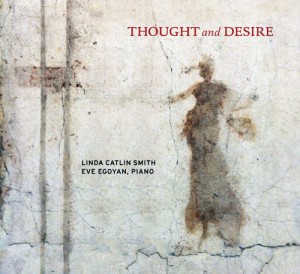New works for solo piano by Linda Catlin Smith performed by Eve Egoyan
World première recordings
This disc is jointly released on Earwitness Editions, Canada, and World Edition, Germany.
Download or Purchase CD’s
Download: iTUNES CD BABY AMAZON BANDCAMP
Physical CDs to purchase online within North America: CD BABY BANDCAMP
Physical CDs to purchase online within Europe: World Edition
Physical CDs for sale in Toronto stores: Soundscapes (572 College Street) and L’Atelier Grigorian (70 Yorkville Avenue)
Recent Reviews:
Musicworks Magazine – Julian Cowley
In his ‘Sonnet 45’ William Shakespeare muses on thought and desire as ‘present-absent’ qualities. Both testify to a bond with the loved one, but they speak also of distance. Pianist Eve Egoyan sings the words of this sonnet as she plays Linda Catlin Smith’s composition Thought and Desire. Her voice has an affectingly delicate, wounded quality, and the piano articulates with comparable sensitivity the rhythmic and melodic contours of the same text, faithfully punctuated. Music and words conspire to convey the bittersweet truth that yearning and imagination are symptoms of separateness. At the same time, Egoyan’s playing seems to spring a hinge between silence and sound, making audible the hyphen that links absence and presence.
Two further world premieres are featured on this beautifully realized and thought-provoking release. The nine movements of Nocturnes and Chorales negotiate a liaison between introspective crepuscular meandering and statements that ring with outgoing purpose. The Underfolding is a self-consciously painterly composition that exploits the piano’s capacity to render textures, layers, and colour combinations. Its figures are elusive, lurking in shade or drawn into more densely harmonized thickets where sonic material is kneaded into a state of mind. Smith’s compositional subtlety and Egoyan’s interpretive grace collude in that remarkable and recurrent alchemy which keeps piano music fresh and vital despite the daunting weight of its history.
The Rambler. Blogging the music that others won’t tell you about. – Tim-Rutherford Johnson
Thought and Desire, a collection of Smith’s piano music played by Canada’s new music champion, pianist Eve Egoyan. I reviewed that disc at the start of the year for Tempo, saying: ‘What particularly excites me about listening to Smith’s music is how hard it is to pin down. … It seems so straightforward in the moment, but becomes impossible to grasp only shortly afterwards, which is perhaps the right way around to be. Much of the music here has a gentle, quasi-improvisatory feel, as short melodies and chord sequences are allowed to turn slowly in the light. Yet within that gentle informality is a precise rightness, like the thousandth kiss from a lifelong lover.’
Smith has a gift – one that I particularly treasure when I find it in music – of turning things suddenly and surprisingly into a new light…. Her most jaw-dropping moment I’ve found so far occurs midway through the piano solo Thought and Desire when suddenly (if a whisper can be sudden) the pianist’s voice enters ‘quietly as though to oneself or someone close by’, murmuring the words of Shakespeare’s Sonnet XLV to a song that until now had been hidden within the piano’s chords.
Smith’s time has, finally, come.
Tempo (A Quarterly Journal published by Cambridge University Press),Volume 70, Issue 276, April 2016 – Tim Rutherford-Johnson
A project supported by the always-interesting World Edition label, and jointly released by them and Earwitness Editions of Canada, this record of Smith’s piano music is played sensitively and subtly by Eve Egoyan.
What particularly excites me about listening to Smith’s music is how hard it is to pin down. To say it is full of contradictions would give the misleading impression that it is somehow engaged in a dialectical struggle with itself, full of rips and tears. But no: I’d say more that it accommodates multiplicity, rather than attempting either a synthesis or a critique.
Let me give an example. I wanted to say at first that Smith’s music is broadly tonal, or at least that it engages with a kind of Debussian extended tonality, but that’s not really true: several passages use robust clusters or darkly dissonant harmonies. Perhaps, rather, it is that she favours materials of a clear character, whether sweet or sour, but then those characters are always being undermined by subtle shifts in pitch or phrasing, unexpected repetitions or sudden breaks. It seems so straightforward in the moment, but becomes impossible to grasp only shortly afterwards, which is perhaps the right way around to be. Much of the music here has a gentle, quasi-improvisatory feel, as short melodies and chord sequences are allowed to turn slowly in the light. Yet within that gentle informality is a precise rightness, like the thousandth kiss from a lifelong lover.
Occupying half the disc is Smith’s series of nine Nocturnes and Chorales. Broadly speaking, the nocturnes are melodic, the chorales harmonic. However, although this division holds pretty well for the first example of each – a slowly looping single thread, and a string of icy, isolated chords – it soon starts to dissolve. Melodies spin out into dreamy ostinati and chords thin down to single notes. Once more, the multiplicity of things is simply accepted and shown for what it is.
The other long piece on the Smith recording is The Underfolding, a 20-minute single span that attempts a musical analogue of the use of layered undertones in painting. Exploiting the piano’s ability to sustain sounds, Smith layers chords – of greater diversity and complexity than else where on this disc – to create an ever-shifting atmosphere that is coloured as much by what lies underneath as what appears on top.
The real prize of the album, however, is the title track, Thought and Desire. Smith draws inspiration from Shakespeare’s Sonnet XLV: ‘The other two, slight air and purging fire’. The music begins with dreamy washes of cluster chords, reminiscent of Henry Cowell at his most limpid. Nothing is quite obvious, but a certain amount of melodic curve can be glimpsed. (Every register of the piano is in play here, and Egoyan balances them beautifully.) Not Shakespeare’s purging fire, but surely his slight air. The truly magical moment occurs, however, midway through as Egoyan starts to sing the text of the sonnet ‘quietly as though to oneself or someone close by’ (as instructed in the score), her voice tracing those curves that until now we have only barely heard. Simple, perfect. When people ask what am I listening to at the moment, this is the music I’ve been telling them about.
The Wire, August 2016 – Julian Cowley
Smith’s setting of a Shakespeare sonnet is performed with real sensitivity by pianist Eve Egoyan. That music artfully matches the poem’s portrayal of two bodies caught within a web of supposition, as anxiety and consolation fluctuate within a love affair.
Alex Ross’ “Nightafternight playlist”, February 2016
Thought and Desire was selected as part of Alex Ross’ “Nightafternight playlist”.
Other Reviews:
Track Listing
1-9 Nocturnes and Chorales (2013) 31:16
10 Thought and Desire (2007) 9:06
11 The Underfolding (2001) 21:02
“Composer Linda Catlin Smith and pianist Eve Egoyan, two of Canada’s most accomplished and remarkable contemporary music professionals, enjoy a rare symbiosis of musical sensitivity and depth. The three performances on this CD celebrate the poetry of sound, the musical essence of the piano and the experience of listening in fresh and moving ways. Eve and Linda have a long history of working together, and we can sense the vibrant conversation and trust that have been established between composer and pianist.
“It is easy to fall under the spell of Linda Catlin Smith’s sound world, the unusual elegance of her writing and her deep intuitive connection with the piano. Her music works exceptionally well on disc where we can share the nuances magnified as Eve Egoyan hears them from the piano’s keyboard. Egoyan’s performance, which shares the multi-dimensional ranges and resonances of the music in exhilarating ways, seems to magically travel through the under-layers of our skin, gently leaving its imprint on our souls.” – Doina Popescu
Linda Catlin Smith grew up in New York and lives in Toronto. She studied music in NY, and at the University of Victoria (Canada). Her music has been performed and/or recorded by: Tafelmusik, Other Minds Festival, California Ear Unit, Victoria and Vancouver Symphony Orchestras, Arraymusic, Tapestry New Opera, Vancouver New Music, Via Salzburg, Evergreen Club Gamelan, and the Del Sol, Penderecki, and Bozzini string quartets, among many others. Her work Ballad (for Eve Egoyan, piano and Andrew Smith, cello) was released on the World Edition label; her solo cd Memory Forms was released on the Artifact Music label. She has been supported in her work by: the Canada Council, Ontario Arts Council, Chalmers Foundation, K.M. Hunter Award, Banff Centre, SOCAN Foundation and Toronto Arts Council; in 2005 her work Garland (for Tafelmusik) was awarded Canada’s prestigious Jules Léger Prize. She teaches composition privately and at Wilfrid Laurier University, Canada.
Eve Egoyan is an artist whose medium is the piano. Her intuitive musicality, insightful attention to detail, and pianistic virtuosity have made her one of the world’s most sought-after interpreters of contemporary music. Eve’s musical interests span extremely contrasting sensibilities: from Alvin Curran’s five-hour long Inner Cities to Erik Satie’s miniatures; from minimalist Simple Lines of Enquiry by Ann Southam to maximalist new complexity works by Michael Finnissy; from the barely audible to roaring overtone-filled resonances; from the rigorous interpretation of a score to free improvisation. Eve’s exploratory nature and restless curiosity have led to numerous collaborations with other artists from a variety of disciplines including technologies in relation to the piano. She has most recently been commissioning works for music and image. She is the Executive Producer on most of her ten solo discs, involved at every level of production from selecting the repertoire and sourcing the funds to overseeing all sound and visual design decisions, lovingly guiding each disc to completion. Her discs have received accolades including “Best Classical” The Globe and Mail (1999) for her first solo CD, and more recently one of “Ten Top” classical discs, The New Yorker magazine (2009), and “Top Classical Disc of the Year”, The Globe and Mail (2011). Eve’s 2016 tour of works for disklavier and image include the Other Minds Festival (San Francisco), Roy and Edna Disney/ CalArts Theatre (Los Angeles), University of California Santa Barbara, University of California Irvine, and Stanford University and the Musée des beaux arts de Montréal at Bourgie Hall in collaboration with McGill University (Montréal). Her recording of Maria de Alvear’s diptych De Puro Amor and En Amor Duro will be released in 2016.
Eve gratefully acknowledges the support of the Canada Council for the Arts for making this recording possible as well as World Edition.

